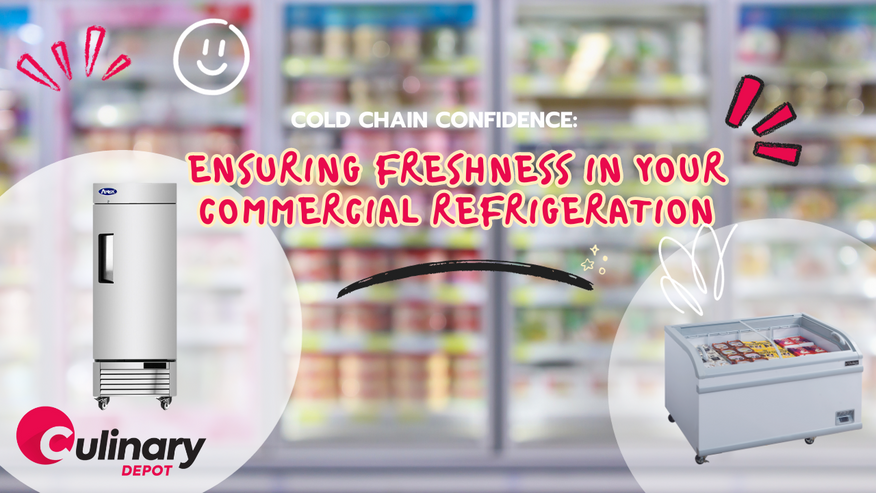Oct 26th 2023 - Team Member
Cold Chain Confidence: Ensuring Freshness in Your Commercial Refrigeration
In the world of commercial kitchens and foodservice establishments, ensuring food safety and freshness is paramount. A critical component of this process is maintaining a reliable cold chain. In this comprehensive guide, we delve into the importance of cold chain confidence and how you can ensure that your commercial refrigeration systems are up to the task.
The Crucial Role of Commercial Refrigeration
Why Freshness Matters

Freshness is not just a matter of taste; it's a key element of food safety. In a commercial kitchen, it's imperative that all food items are stored at the correct temperatures. Commercial refrigeration systems play a pivotal role in preserving the quality and safety of perishable items, ensuring that dishes served to customers are not only delicious but also safe to consume.
The Cold Chain: An Overview
The cold chain encompasses the entire journey of a food item from the moment it's produced or harvested until it reaches the consumer's plate. This journey includes various stages such as storage, transportation, and preparation. At each step, maintaining the right temperature is crucial to prevent bacterial growth and foodborne illnesses.
The Components of an Effective Cold Chain

1. Proper Storage
Commercial refrigerators and freezers are the backbone of food storage in any commercial kitchen. Proper storage ensures that ingredients remain fresh and safe. It's essential to choose the right refrigeration equipment, including reach-in and walk-in units, to accommodate the volume and types of ingredients your kitchen handles.
2. Temperature Control
Precise temperature control is non-negotiable in maintaining the cold chain. Your refrigeration equipment must be capable of maintaining consistent temperatures, and it's equally important to monitor and document these temperatures. Investing in modern refrigeration systems equipped with temperature monitoring and alarm systems can provide an added layer of security.
3. Quality Equipment Maintenance
Regular maintenance of your commercial refrigeration units is essential. Dust, dirt, and debris can affect their performance, leading to inconsistent cooling and potential food safety risks. Scheduled maintenance, including cleaning condenser coils and checking refrigerant levels, is vital to ensure equipment operates optimally.
A Focus on Freshness: Best Practices
1. First-In, First-Out (FIFO)

Implementing a FIFO system is a straightforward but effective way to ensure freshness. It involves using the oldest inventory items first, reducing the risk of food items expiring or becoming unusable.
2. Food Rotation and Labeling
Proper food rotation, combined with clear labeling, is a must. This practice helps kitchen staff identify the shelf life and usage dates of various food items, reducing waste and ensuring that only fresh ingredients are used.
3. Training and Hygiene
Ensuring that your kitchen staff are well-trained in food safety and hygiene practices is essential. Employees should know how to handle food safely and maintain the integrity of the cold chain.
4. Temperature Checks
Regular temperature checks on both storage units and individual food items are crucial. These checks are part of a proactive approach to identifying and addressing potential issues before they impact food safety.
Cold Chain in Action
Culinary Depot's Commitment to Freshness
Culinary Depot understands the significance of the cold chain in the foodservice industry. As a leading provider of commercial kitchen equipment and refrigeration solutions, they offer a range of cutting-edge refrigeration equipment that ensures the freshness of ingredients and prepared dishes.
Our refrigeration products come with advanced features such as digital temperature control, automatic defrost cycles, and high-efficiency compressors, all designed to maintain the cold chain precisely.
Conclusion: Freshness is Non-Negotiable
In the commercial kitchen, freshness is not just a selling point; it's an essential element of food safety. The reliability of your cold chain hinges on maintaining consistent temperatures, adhering to best practices, and investing in quality refrigeration equipment.
By adhering to these principles and understanding the critical role of cold chain management, you can serve your customers delicious and safe food while building a reputation for quality and safety in the competitive world of foodservice. Cold chain confidence is not just a choice; it's a necessity for any successful kitchen operation.

